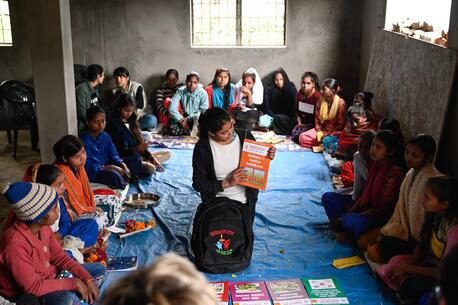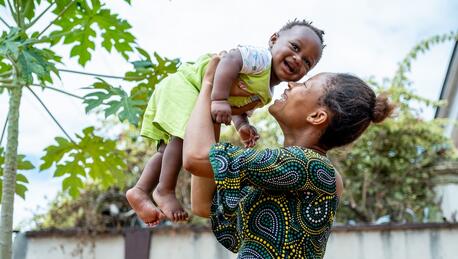UNICEF and the Olympics: Changing children’s lives through sports
In this second week of the Olymic Games, we wanted to let you know about a global sports program for children that has been taking place in conjunction with the Olympics. It’s called International Inspiration and is the result of a pledge that Seb Coe, who led London’s bid for the Olympics, made when London was chosen to host the 2012 Games: to connect children to the transformative power that the Games have and inspire them to play sports and improve their lives as a result. The program’s mission is simple: Bring sports to 12 million children in 20 countries. And that's not the only way that UNICEF is connected to the Olympics. The NBA, a long-time supporter of UNICEF's work, is well represented at this year’s Games.
Last week, as the world gathered to watch the Olympic Games, we ran a blog post about how UNICEF uses sports to improve children’s lives.
Today, we wanted to let you know about a global sports program for children that has been taking place in conjunction with the Olympic Games. It’s called International Inspiration and is the result of a pledge that Seb Coe, who led London’s bid for the Olympics, made when London was chosen to host the 2012 Games. He wanted to connect children to the transformative power that the Games have and inspire them to play sports and improve their lives as a result. The program’s mission is simple: Bring sports to 12 million children in 20 countries.
 International Inspiration, created in partnership with UK Sport, UNICEF, the British Council, the London Organizing Committee of the Olympic Games and Paralympic Games and other supporters, spans across five continents and 20 countries. Part of the program’s success lies in its ability to adapt: The individual sports programs are specifically designed for each community to meet real needs in the most effective and culturally aware ways. The programs range from teaching children in flood-prone Bangladesh to swim to raising HIV/AIDS awareness in South Africa. Beyond getting children involved in sports, International Inspiration is also working with governments to make changes to curriculums and national policies that will benefit children in the long term. Here are just a few examples of International Inspirations at work:
International Inspiration, created in partnership with UK Sport, UNICEF, the British Council, the London Organizing Committee of the Olympic Games and Paralympic Games and other supporters, spans across five continents and 20 countries. Part of the program’s success lies in its ability to adapt: The individual sports programs are specifically designed for each community to meet real needs in the most effective and culturally aware ways. The programs range from teaching children in flood-prone Bangladesh to swim to raising HIV/AIDS awareness in South Africa. Beyond getting children involved in sports, International Inspiration is also working with governments to make changes to curriculums and national policies that will benefit children in the long term. Here are just a few examples of International Inspirations at work:

Olympic Torch Relay: Shoriful Islam from Bangladesh runs as part of the International Inspiration team of young people. © LOGOC
- In Mozambique, where Physical Education is traditionally not part of the school curriculum, 200,000 children are now taking PE classes.
- In Bangladesh, over 80,000 children have learned vital survival swimming skills.
- In South Africa, educators have been trained to teach life skills and HIV/AIDS prevention to kids who play team sports like soccer or cricket.
- In Trinidad and Tobago, International Inspiration is using sports to provide safe spaces where children can address social issues like gang crime and can develop skills to improve their future prospects.
- In Nigeria, a landmark school sports policy is being developed, which will protect the rights of girls and children with disabilities.

